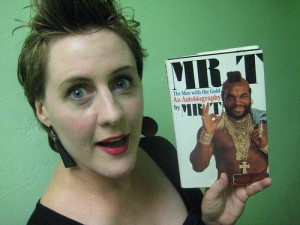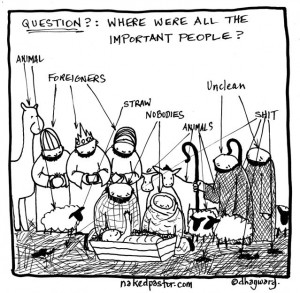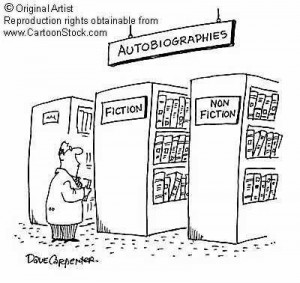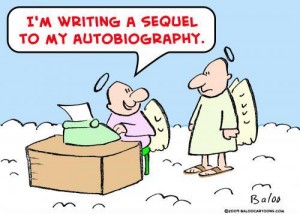Discussing De-Facement: Discussing De-Man
by Ilya Benjamin
Autobiography TOO BIG for GENRE Britches?!
 De-Man who is similar to Derrida in all but style, seems bored with the “predictable monotony” regarding critical approaches to reading/interpreting autobiography. It makes no sense to lump autobiography into the literature category if it can’t be interpreted creatively because of its over-pronounced proximity to truth, he argues. It is also disingenuous to read/interpret it as fact when it typically presents only the most flattering of “self-portraiture,” an assemblage of half-trues strung together with questionable intent. Tongue and cheek, De-man states for the matter, “any book with a readable title page is, to some extent autobiographical” (922). De-Man’s own critical essay could be read as autobiographical as the title obviously reflects his own proper name in the title itself; an article on “De-facement by De-Man(920).
De-Man who is similar to Derrida in all but style, seems bored with the “predictable monotony” regarding critical approaches to reading/interpreting autobiography. It makes no sense to lump autobiography into the literature category if it can’t be interpreted creatively because of its over-pronounced proximity to truth, he argues. It is also disingenuous to read/interpret it as fact when it typically presents only the most flattering of “self-portraiture,” an assemblage of half-trues strung together with questionable intent. Tongue and cheek, De-man states for the matter, “any book with a readable title page is, to some extent autobiographical” (922). De-Man’s own critical essay could be read as autobiographical as the title obviously reflects his own proper name in the title itself; an article on “De-facement by De-Man(920).
Since we can’t say what autobiography is, let’s explore what it is not. It is not a literary genre among other literary genres. Genre presumes an aesthetic criterion. Ultimately one could argue special skill or creative talent is required to write lyric or say a novel. How does someone evaluate the skill or novelty of, “mere reportage, chronicle, or memoir” of one’s own life? (919). Personal chronicles or “autobiography” elevated to even moderate positions within the canonical hierarchy, according to De-Man and I agree, “always look slightly disreputable and self-indulgent” comparably speaking (922). Autobiography cannot be entirely fiction. It insists upon itself too much. It’s not exactly history. It’s typically too flattering and void of context. In a way, outside of the form’s generic insistence on its proximity to truth there’s very little to go on. De-Man attributes this feature to a so-called, “incompatibility with the monumental dignity of aesthetic values” (919).
WHO ARE YOU AND HOW DO WE READ FOR TRUTH?!
 How do we know we are reading autobiography? Can autobiography be written in verse?” for example, he asks rhetorically. Better to say that autobiography is a type of reading activated by certain “tropes” such as birth, life, and death or the use of a verifiable proper name. How or what these tropes activate remains a mystery. Rarely is the reader in a position or so inclined to fact check the details of Autobiography unless s/he is so motivated to authenticate. Autobiography it appears must be served up that way. Techniques the author employs for example the use of proper names, and “tropes” like birth, life and death aid facilitate the perception of “alignment.” We must also consider the fact that some of these distinctions occur naturally within other more assertive forms of fiction. Realism in the novel for example is critiqued by its proximity to “life” while Sci-fi is reserved for more fantastical fictional renderings. Realist fiction like some of the works of de Balzac for example relied heavily on “real” locations and proper names. I visited the famous Pere Lachaise cemetery in Paris, the final resting pace of Black author Richard Wright and musician Jim Morrison only having learned about it from reading Balzac’s realist novel Pere Goriot. No matter how realist, Pere Goriot is most certainly classified as bonafide fiction. I will carry my digression a bit further and ask, what are we to make of science fiction (sci-fi) for that matter? The pendulum certainly swings in the direction of the fantastical side? Yet, more and more, especially in the 21st century, I have been privilege to witness an era of sci-fi come true. De-Man’s tongue and cheek comment that, “any book with a readable title page is, to some extent autobiographical, is perhaps not so tongue and cheek (922).
How do we know we are reading autobiography? Can autobiography be written in verse?” for example, he asks rhetorically. Better to say that autobiography is a type of reading activated by certain “tropes” such as birth, life, and death or the use of a verifiable proper name. How or what these tropes activate remains a mystery. Rarely is the reader in a position or so inclined to fact check the details of Autobiography unless s/he is so motivated to authenticate. Autobiography it appears must be served up that way. Techniques the author employs for example the use of proper names, and “tropes” like birth, life and death aid facilitate the perception of “alignment.” We must also consider the fact that some of these distinctions occur naturally within other more assertive forms of fiction. Realism in the novel for example is critiqued by its proximity to “life” while Sci-fi is reserved for more fantastical fictional renderings. Realist fiction like some of the works of de Balzac for example relied heavily on “real” locations and proper names. I visited the famous Pere Lachaise cemetery in Paris, the final resting pace of Black author Richard Wright and musician Jim Morrison only having learned about it from reading Balzac’s realist novel Pere Goriot. No matter how realist, Pere Goriot is most certainly classified as bonafide fiction. I will carry my digression a bit further and ask, what are we to make of science fiction (sci-fi) for that matter? The pendulum certainly swings in the direction of the fantastical side? Yet, more and more, especially in the 21st century, I have been privilege to witness an era of sci-fi come true. De-Man’s tongue and cheek comment that, “any book with a readable title page is, to some extent autobiographical, is perhaps not so tongue and cheek (922).
WHAT’S REALLY AT STAKE: WHO’S AFRAID OF A REVOLVING DOOR?!
 De-man says what’s at stake is, “not only the distance that shelters the author of autobiography from his experience, a so-called buffer that protects the fiction writer, “but the possible convergence of aesthetics and of history” (919). I ask, who has the final say? When the dividing line between Fact and fiction is blurred, what’s Really At STAKE? Coincidentally, the desire to demarcate autobiography as a “genre” emerges at a time when science and rational thinkers begin to hardline the differences between fact and fiction. This occurs for a variety of reasons I am sure, one of which was to legitimize “scientific knowledge” and its corresponding methods of inquiry. Another innovation coincidentally that developed involved legal other reasons were wrapped in legal implications and other “rational endeavors.” The difference between fact and fiction is a tight rope rather than a “revolving door” (921). If a certain reality and other “fact” based endeavors are to be legitimized, meaning must be stabilized. Productivity and “progress” depends on these unsorted definitions.
De-man says what’s at stake is, “not only the distance that shelters the author of autobiography from his experience, a so-called buffer that protects the fiction writer, “but the possible convergence of aesthetics and of history” (919). I ask, who has the final say? When the dividing line between Fact and fiction is blurred, what’s Really At STAKE? Coincidentally, the desire to demarcate autobiography as a “genre” emerges at a time when science and rational thinkers begin to hardline the differences between fact and fiction. This occurs for a variety of reasons I am sure, one of which was to legitimize “scientific knowledge” and its corresponding methods of inquiry. Another innovation coincidentally that developed involved legal other reasons were wrapped in legal implications and other “rational endeavors.” The difference between fact and fiction is a tight rope rather than a “revolving door” (921). If a certain reality and other “fact” based endeavors are to be legitimized, meaning must be stabilized. Productivity and “progress” depends on these unsorted definitions.
Perhaps ultimately, the market has the final say about whose biographies we are willing to read, if scholars are unable to uphold a standard. Autobiography has the potential for vast inclusivity might be enough to make many a cultural elitist or purist cringe at the very idea of such mass participation, thereby potentially diluting the form and diminishing its canonical prestige. Being caught in a revolving door is indeed frightening, but it is only the tip of the iceberg.
Articles on Sci-Fi come true:
http://mashable.com/2010/09/25/11-astounding-predictions/
http://news.discovery.com/tech/biotechnology/2012-science-fiction-became-fact-121226.htm
http://www.huffingtonpost.com/2012/07/20/science-fiction-predictions-true_n_1689476.html
DISCUSSION QUESTIONS
Q1: Question# 1. Outside of an “alignment” between a proper name, autobiographical subject and the authorial claim to self-knowledge, does Autobiography possess any Aesthetic?
Q2: Outside of the author, publisher or editor circumscribing the text as autobiographical, what tropes activate an autobiographical reading? How is this reading triggered in less obvious forms like poetry, art or criticism?
Q4: If autobiography is not a literary genre, could it be read as historical? What’s at stake reading autobiography under the broader canopy of history?
Q5: Who knows me better than me? Why doesn’t autobiography constitute self-knowledge?




Just as a side note, I realized that the autobiography of Mr. T was the first autobiography I ever read. I thought it was great…I was 10 and T certainly didn’t hold back any. Descriptions of his life in the Cabriani Green housing projects, his time as a body gaurd, teen mentor and tough guy competitor were all pretty compelling to a kid being exposed to this kind of information.
Q1: I believe an autobiography needs to possess an aesthetic to be “readable” or at least deemed worthy of a literary classification. Any body of work can possess an object, subject, plot, timeline, etc. yet does not have to have an aesthetic to it. But then why would we read it? The Autobiography of Malcom X, A Long Walk To Freedom, these or any other famous autobiographies are only so because their stories are written in a manner wherein they are riveting. KNowledge of a life’s events is one thing, having it retold as spectre is something very diffrent.
Q2: The trope would be a life event as it happened; a true life event that, while dramatized, is irrefutably factual. There can be nostalgia, sentimentality and reflection which crafts the storyaround the life. Art, poetry and criticism are direct interpretations of the story surrounding and alluding to a truth.
Q4: Autobiography can and should be read as historical, because even if fictional liberties are taken with the subject it is still a reflection of a time, space, cultural and contextual nuances that give information about behavior and environment. What’s at stake in reading an autobiography is the acceptance that this one version of history is true for all. However the opposite is also true – the more life stories that emerge bring forth a more nuanced view of history.
Depending on who you ask, we cannot know ourselves by ourselves. It is the mirror that tells us about ourselves and not us reflecting on seeing ourselves in the mirror. Without being to cliche or Zen, the finger that points to the moon is not the moon. Autobiography is a version of events, however one’s life can have many different perspectives aside from one’s own.